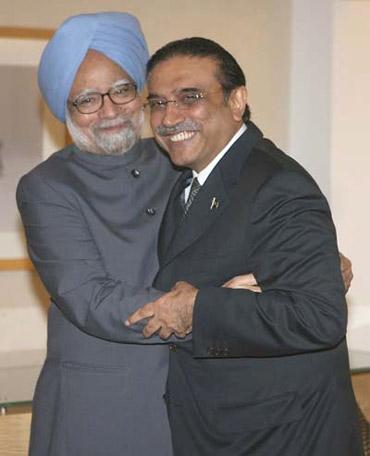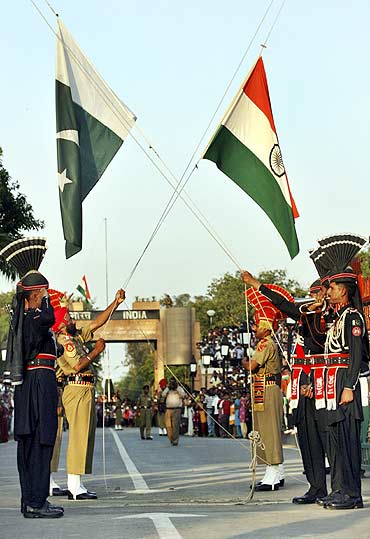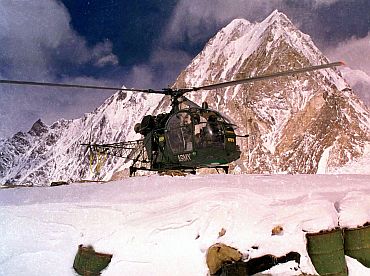
Dr Manmohan Singh is the woolly-headed idealist ready to make any sacrifice to woo Pakistan quite unmindful of its inimical mindset vis a vis India, feels former Deputy National Security Adviser Satish Chandra.
Pakistan President Asif Ali Zardari's upcoming visit to India on April 8 shares some commonalities with then Pakistan president Zia-ul Haq's visit in February 1987 and Prime Minister Yousaf Raza Gilani's visit in March 2011.
In all three cases the visits were arranged at short notice and their ostensible purpose -- a pilgrimage to Ajmer in Zardari's case and to watch a cricket match in the case of the other two -- was different from the real objective notably to touch base with the Indian prime minister.
Furthermore, as it happened during the visits of the earlier two Pakistani dignitaries, the Indian prime minister will host a lunch for Zardari, and like in those visits, little by way of concrete agreements is likely to emerge.
While it was only with much reluctance that Prime Minister Rajiv Gandhi agreed to receive Zia, Dr Manmohan Singh went out of his way to host the Gilani visit and now the Zardari visit and may, in fact, even have engineered them.
This difference in approach is reflective of the qualitative differences between Rajiv Gandhi -- the realist, steadfast in not making any concessions to an unreliable Pakistan which could compromise the national interest -- and Dr Singh -- the woolly-headed idealist ready to make any sacrifice to woo Pakistan quite unmindful of its inimical mindset vis a vis India.
Please ...

Though it is unlikely that any agreements will be signed during the Zardari visit, one may expect that discussions would focus on a variety of India-Pakistan issues.
One would expect that terrorism would be at the top of the agenda particularly in the context of the bounty of $10 million recently announced by the United States on Hafiz Saeed.
Other important issues likely to be discussed are Kashmir, on which the revived back channel must have provided inputs, Siachen, Sir Creek, visa liberalisation, trade, water etc, as well as the strategy to be adopted for follow on talks.
The importance of Zardari's visit to India lies not in whether or not anything tangible emerges therefrom, in terms of resolving differences, but in building up an atmosphere of warmth quite divorced from reality which would facilitate Dr Manmohan Singh's visit to Pakistan in the coming months.
An invitation for the same was extended by Hina Rabbani Khar, thePakistan foreign minister, during her visit to India in July 2011. This was reiterated by Prime Minister Gilani during the SAARC summit in the Maldives in November 2011 and at his meeting with Dr Singh in Seoul in March.
President Zardari will no doubt repeat it in New Delhi and perhaps even reach some understanding on the areas on which it may be feasible to sign agreements when Dr Singh visits Pakistan so as to be able to project the same as a grand success.
It is regrettable that the government has been complicit in helping create the illusion of increasing warmth in India-Pakistan relations by its acts of omission and commission.
By failing to impose any penalties on Pakistan for its involvement in the Mumbai attacks of November 26, 2008, as well as subsequent terrorist attacks like those in 2011 in Mumbai and Delhi, it has virtually brushed this issue under the carpet.
No wonder, that those involved in the Mumbai attacks have not been punished and Pakistan continues to export terror to India with impunity.
Please ...

India's tolerance for Pakistan's recalcitrance on this count has enabled the two countries to maintain the facade of a business as usual relationship.
Second, contrary to commitments made by the government, including by the prime minister himself in Parliament in July 2009 that Pakistan had 'to act and act effectively on terrorism' for any comprehensive dialogue with it, the same has been undertaken without the latter having brought to book the perpetrators of the Mumbai attacks or having shut down the infrastructure of terror.
Third, India last year went so far as to withdraw its opposition to an European Union concessional trade package for Pakistan even though this action has hurt our own textile exports. It has been argued that Pakistan reciprocated our generosity by moving some way towards an MFN (Most Favoured Nation) regime for India.
It needs to be noted, however, that this Pakistani move, which has been hailed with so much fanfare by our leaders, is no favour to us as we had accorded MFN treatment to Pakistan way back in the mid 1990s.
Moreover, by not according MFN treatment to India, Pakistan was only depriving itself of access to competitively priced Indian goods and having to pay much more for similar imports from elsewhere.
In brief, by more or less taking terrorism out of the equation, by resuming the composite dialogue process, by frequent meetings at the head of State and head of government level, albeit on the sidelines of other regional and international meetings, and by hailing Pakistan's belated moves towards according India MFN treatment as suggestive of a change of heart towards India, a wholly erroneous impression is being created.
An impression that we are on the cusp of an improved India-Pakistan relationship has been created, which is at complete variance with the fact that Pakistan has given India no satisfaction on terrorism and through 2011 pumped in as much as Rs 16 billion of fake Indian currency into the country in support of terrorism.
Please ...

Against this backdrop, one needs to be concerned about the nature of agreements that Dr Manmohan Singh is likely to arrive at when he goes to Pakistan given out proclivity to readily make concessions and Pakistan's aversion to make the slightest compromise.
While a settlement on Kashmir is not on the cards, as any Indian leader would be most unwise to commit himself in this matter without a prior consensus within the Indian political firmament, agreement on issues of lesser import like visas, Sir Creek and Siachen are a possibility.
On the latter two it is hoped that in our anxiety to reach out to Pakistan there is no deviation from our existing negotiating positions as they are minimalist in nature.
On Sir Creek one should maintain the stance so far taken by us that the boundary should be in the mid channel of the Creek as per international practice and not succumb to a settlement on the basis of Pakistan's claim that the boundary should be on the Eastern side of the Creek.
Should we do so not only would there be an obvious loss of some territory in the Creek area but also serious negative implications in determining our maritime boundary and exclusive economic zone.
Similarly, on Siachen, we need to hold firm to our position that any demilitarisation of the area would be contingent on a description in the agreement of the existing disposition of the forces of the two sides and the positions that they would be redeployed to, accompanied by a map and a clear assertion that no forward movement in the area would be undertaken by the forces of the two sides.
Pakistan's reluctance to plot the positions of the forces of the two sides in the main agreement places in doubt its bona fides.
...